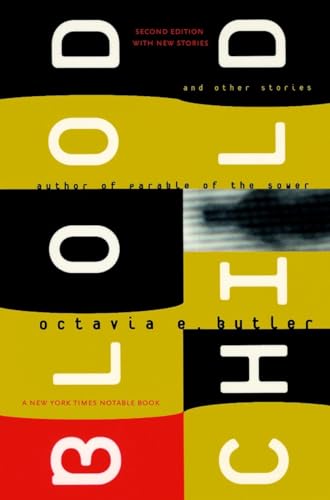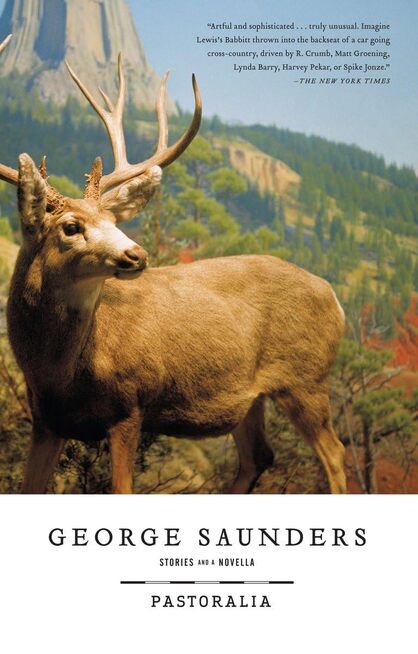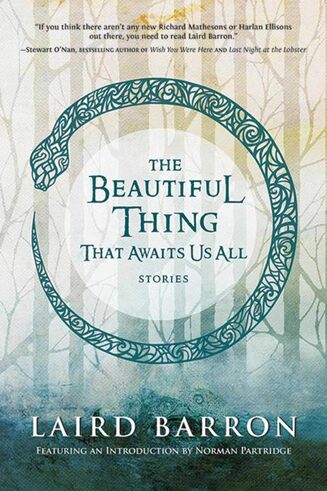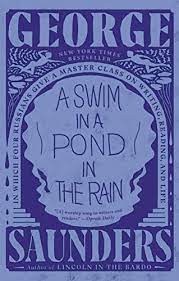|
Bloodchild collects seven stories and two essays by Octavia Butler. She died in 2006 but remains a fixture of science fiction and fantasy.
Of these stories, my favorite was “Amnesty,” about humans adapting to extended-stay alien visitors. The story invites you to consider if and how you would resist invasion. The whole story was strong, but the last couple of lines left me all shook up. But all of the stories are strong, with themes of illness and alien encounters show up repeatedly. And the essays are about Butler’s life and her thoughts on writing. They’re lovely. I quite enjoyed the audiobook as narrated by Janina Edwards. It’s a quick listen or a quick read, and a good entry for readers who aren’t familiar with Butler.
0 Comments
George Saunders is the best contemporary American writer, an opinion I feel more comfortable holding following the deaths of first Toni Morrison and then Cormac McCarthy.
Unusually among successful writers, his primary medium is short fiction. He’s only got the one novel, Lincoln in the Bardo, which is so good that he should probably stop there. Pastoralia is his second collection of short stories, published in 2000. Prose craft is different from storytelling. Being good at either one of these things is uncommon. Each Saunders sentence writes is a gem, but handled in such a lowkey way that you don’t realize you’re reading a master. You’re too focused on turning the pages because you need to know what happens next. Though if you enjoy audiobooks, I would implore you not to turn the pages but to listen to Saunders narrate his own work. The thing about Saunders that too many reviews miss is that he’s funny. Uproarious. The man is funny in print, but I listened to the book and I was howling. Also: when you listen, you can’t look ahead to know when a story is about to end. Three different times in this book, a story ended and I gasped out loud in shock. There are only six stories so that is a fifty percent gasp rate. My favorite story was “Pastoralia,” about some historical reenactors, but the one I’m going to quote from is “Sea Oak,” in which an elderly aunt bullies her nephew (a sex worker) into earning more money: “Show your cock. It’s the shortest line between points.” Laird Barron writes horror with more literary flair than normal, like Henry James but with satanists. In more contemporary terms, his style reminds me of John Langan or John Horner Jacobs, people who take care with their prose but who aren't afraid to throw around shapeshifters or occultists to keep the peasants in line.
The Beautiful Thing That Awaits Us All is a collection of longish short stories set primarily in the American Pacific northwest. My favorite was "The Hand of Glory," which reads more like prohibition noir than horror, at least till the twist at the end. If you've ever enjoyed one of Stephen King's gangster stories, you'll like this--same boozy atmosphere where life may be cheap but the dames ain't. Are these stories scary? My scare meter broke a good thirty years ago. The same way chronic smokers can't taste spice in their curry, I can't detect terror in my fiction. But I found them enjoyable, especially as narrated by the hardboiled voice of Ray Porter, who also did a standup job with the Amityville Horror. More on that next week, I think... A version of this post originally appeared on January 28, 2023.
George Saunders is in the very top echelon of my favorite writers. A literary fiction writer who leans hard into genre, he is arguably America's best contemporary short story writer, and his one novel, Lincoln in the Bardo, will stagger you. I'm getting into the yearly habit of reading him in January, to start the year out right. This year I read A Swim in a Pond in the Rain. It is not short stories nor a novel but... literary criticism! Of Russian literature! I know this is going to be a hard sell, but stay with me here. The book is just astonishingly good. It's like being in the best graduate level English class, only you don't have to write papers or read Derrida. Saunders helps us dive into seven masterpieces, helping us as readers articulate why we respond to the writing, helping us as writers study the craft. This book was such a joy. I kept making excuses to get to the audiobook--and please, if you're going to read this, consider going that route. Saunders narrates the discussion, while actors read the stories:
|
Book talks
When Covid first hit, I started doing book talks on social media as a way to keep in touch with people. I never got out of the habit. I don't discuss books by my clients, and if I don't like a book, I won't discuss it at all. While I will sometimes focus on craft or offer gentle critical perspectives, as a matter of professional courtesy, I don't trash writers. Unless they're dead. Then the gloves come off. Archives
February 2024
Tags
All
|





 RSS Feed
RSS Feed